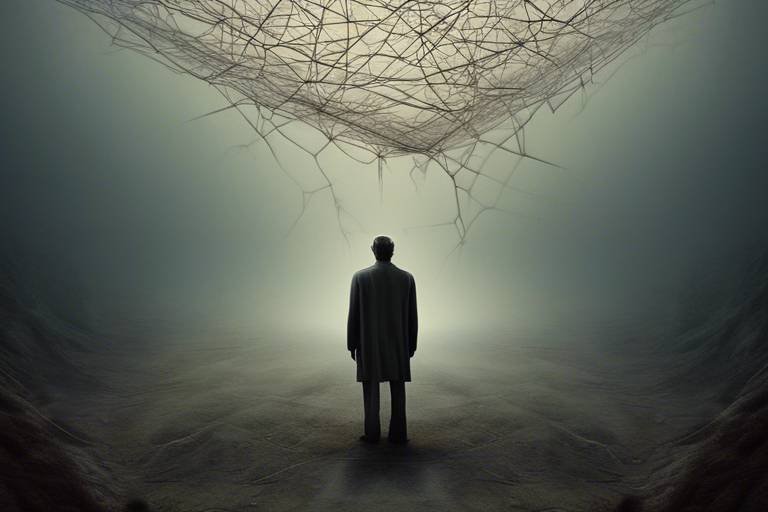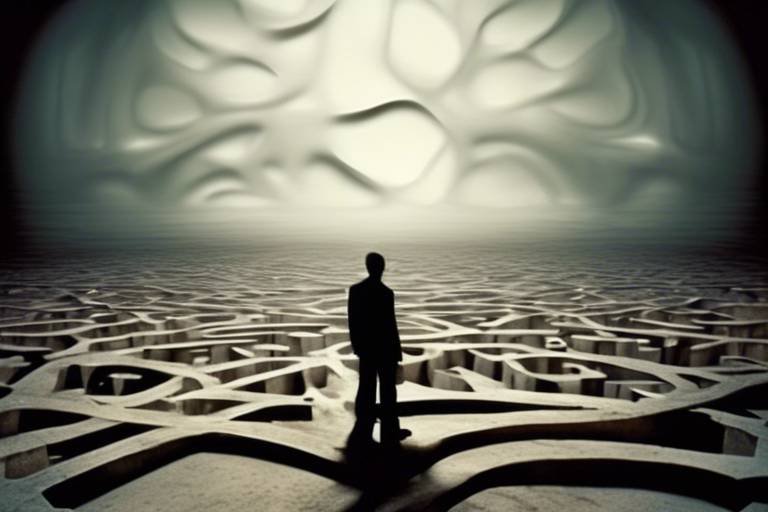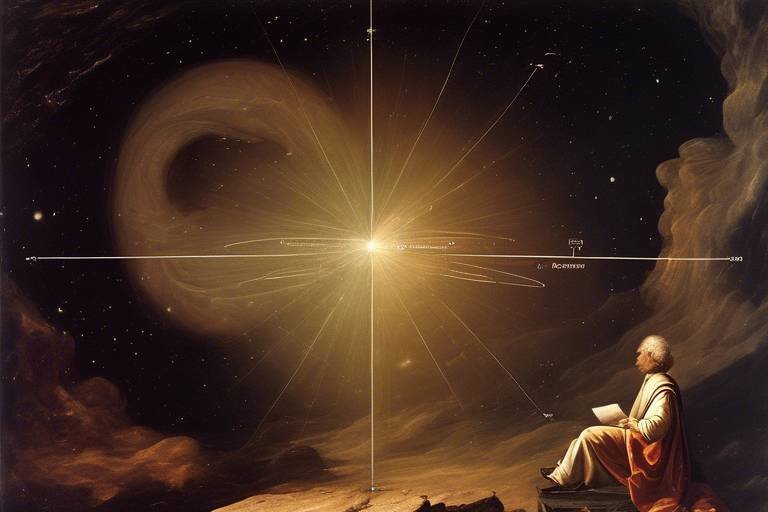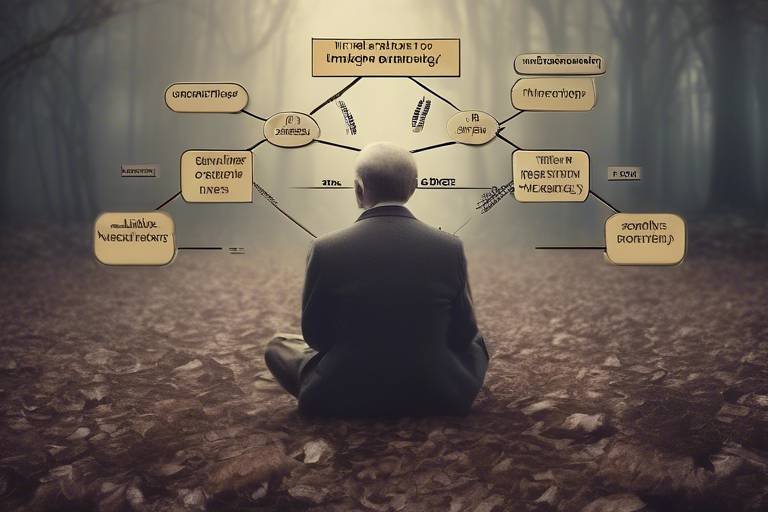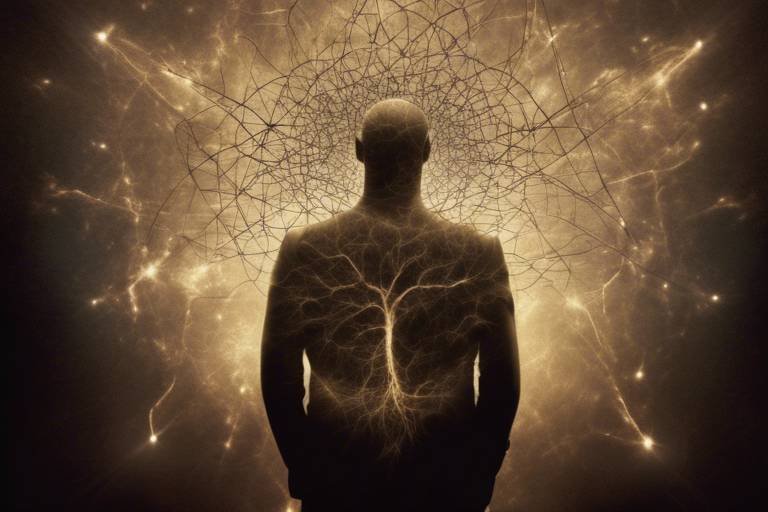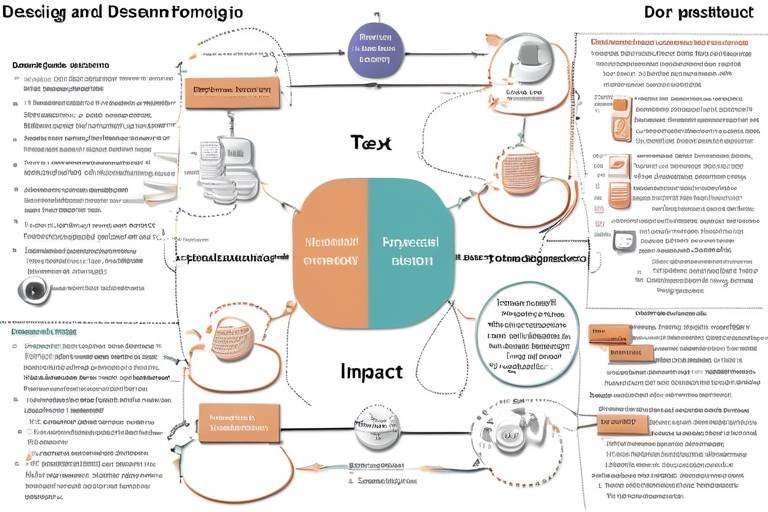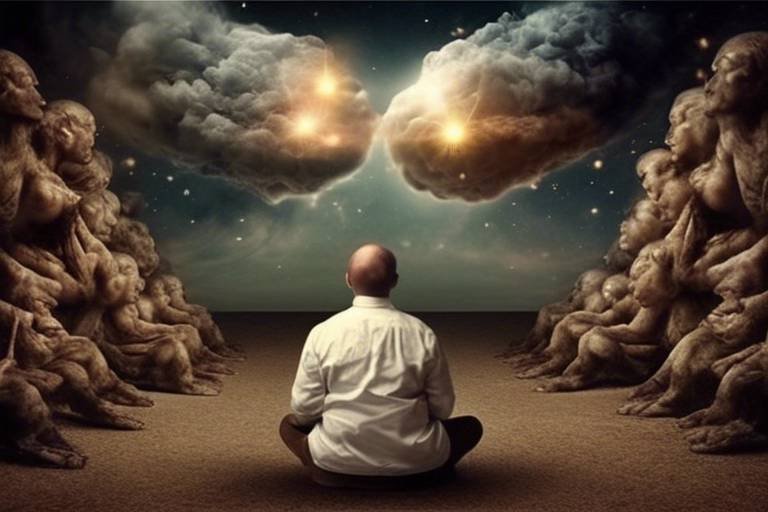What Does Metaphysics Say About Human Consciousness?
Human consciousness is one of the most profound mysteries that has captivated thinkers for centuries. When we dive into the realm of metaphysics, we encounter a tapestry of ideas that challenge our understanding of existence and awareness. So, what exactly does metaphysics say about consciousness? Is it merely a byproduct of the brain's physical processes, or is there something more transcendent at play? This exploration invites us to ponder the very essence of our being, the nature of reality, and the intricate relationship between mind and matter.
At its core, metaphysics seeks to answer the fundamental questions of life, and consciousness is at the heart of this inquiry. Imagine consciousness as a vast ocean, with waves representing our thoughts, emotions, and perceptions. Each wave is unique, yet they all arise from the same deep, underlying sea. This analogy helps us grasp the complexity of consciousness and its connection to the physical world. By examining various philosophical perspectives, we can begin to untangle the threads that bind consciousness to our understanding of reality.
Throughout history, different cultures and thinkers have approached the topic of consciousness in diverse ways. For instance, while Western philosophy often emphasizes a dualistic perspective—separating mind and body—Eastern philosophies tend to view consciousness as a unified experience. This contrast raises intriguing questions: Are we merely our thoughts and feelings, or is there a deeper essence that defines who we are? As we delve deeper into metaphysical thought, we will uncover the rich tapestry of ideas that illuminate our understanding of consciousness.
In the following sections, we will explore key concepts and historical perspectives that have shaped our understanding of consciousness. We will examine the dualistic views of thinkers like René Descartes, who famously declared, "I think, therefore I am," and contrast them with the idealist perspectives that suggest reality is fundamentally mental. Additionally, we will venture into Eastern philosophies, where the notions of non-dual awareness and meditation practices provide unique insights into the nature of consciousness.
Ultimately, the exploration of consciousness through the lens of metaphysics is not just an academic exercise; it invites us to reflect on our own experiences and the nature of our existence. By engaging with these profound questions, we not only expand our intellectual horizons but also gain a deeper appreciation for the mystery that is human consciousness. So, buckle up as we embark on this fascinating journey through the metaphysical landscape of consciousness!

The Nature of Consciousness
This article explores the intricate relationship between metaphysics and human consciousness, delving into philosophical perspectives, theories, and implications that shape our understanding of existence and awareness.
Understanding consciousness is fundamental in metaphysics. At its core, consciousness can be described as the state of being aware of and able to think about one’s own existence, thoughts, and surroundings. It is not merely a passive experience; rather, it is an active engagement with the world that shapes our perceptions and interactions. Imagine consciousness as a vibrant tapestry woven from the threads of our thoughts, emotions, and sensory experiences. Each thread contributes to the overall picture of who we are and how we experience life.
One of the most intriguing aspects of consciousness is its characteristics. It encompasses a range of phenomena, including perception, thought, memory, and self-awareness. These elements work together to create a rich inner life, allowing us to reflect on our experiences and make decisions. But what exactly is the relationship between consciousness and the mind-body connection? This is where metaphysical inquiries become particularly fascinating. Some argue that consciousness is a product of physical processes in the brain, while others believe it transcends the physical realm, suggesting a deeper, perhaps spiritual, essence.
The relationship between consciousness and the mind-body problem raises profound questions. For instance, can consciousness exist independently of the body, or is it inextricably linked to our physical form? This dilemma invites various interpretations, each offering unique insights into our existence. The metaphysical implications of these interpretations can lead us down a rabbit hole of philosophical exploration.
To illustrate this, let’s consider a few key perspectives:
- Materialism: This view posits that everything, including consciousness, is a result of physical processes. According to materialists, consciousness is merely the byproduct of brain activity.
- Idealism: In contrast, idealists argue that consciousness is fundamental to reality itself, suggesting that the material world is an extension of our mental experiences.
- Dualism: As we will see later, dualism, famously advocated by René Descartes, posits a distinct separation between mind and body, raising questions about how these two realms interact.
Ultimately, the nature of consciousness remains one of the most profound mysteries in metaphysics. It challenges our understanding of what it means to be human and compels us to explore the depths of our own awareness. As we delve deeper into this exploration, we find that consciousness is not just a feature of our existence; it is the lens through which we experience life itself. It shapes our reality, influences our actions, and ultimately defines our humanity.
- What is consciousness? Consciousness is the state of being aware of and able to think about one’s thoughts, feelings, and surroundings.
- How does consciousness relate to the mind-body problem? The mind-body problem examines the relationship between mental states and physical states, raising questions about whether consciousness is a product of the brain or exists independently.
- What are the main philosophical perspectives on consciousness? Key perspectives include materialism, idealism, and dualism, each offering different interpretations of the nature and function of consciousness.

Historical Perspectives on Consciousness
Throughout history, the concept of consciousness has fascinated philosophers, scientists, and thinkers alike. From ancient civilizations to contemporary debates, the exploration of what it means to be conscious has evolved dramatically. This evolution highlights a myriad of perspectives that have shaped our understanding of consciousness and its place in the universe. By examining these historical perspectives, we can gain insight into how our current views have been influenced by past thinkers.
In ancient philosophy, figures like Socrates, Plato, and Aristotle laid the groundwork for metaphysical inquiry into consciousness. Socrates famously emphasized the importance of self-knowledge, suggesting that understanding oneself is crucial to understanding one’s consciousness. Plato, on the other hand, introduced the theory of forms, which posited that the material world is a shadow of a higher reality, thus implying that consciousness might have a dual nature—one that transcends the physical realm. Aristotle critiqued his predecessors and focused on empirical observation, suggesting that consciousness is tied to the body and its functions.
Fast forward to the Renaissance, where thinkers like René Descartes revolutionized the discussion with his dualistic approach. Descartes famously declared, “Cogito, ergo sum” (I think, therefore I am), establishing the notion that consciousness is a defining characteristic of human existence. His dualism posited a clear separation between mind and body, leading to the enduring mind-body problem. This problem questions how mental states, such as thoughts and feelings, can arise from physical processes in the brain. The implications of Descartes' ideas were profound, igniting debates that continue to this day.
As we delve deeper into the historical perspectives, it’s essential to note the critiques that arose against dualism. Philosophers like Baruch Spinoza and later David Hume challenged the idea of a distinct separation between mind and body. Spinoza proposed a monistic view, suggesting that mind and body are two aspects of the same substance. Hume, on the other hand, argued that consciousness is a collection of perceptions rather than a singular, unified entity. These critiques paved the way for alternative theories that sought to reconcile the relationship between mental and physical states.
Moreover, the 19th century brought about significant advancements in psychology and neuroscience, further complicating the metaphysical landscape of consciousness. Thinkers like William James introduced the idea of consciousness as a stream, emphasizing its dynamic and ever-changing nature. This perspective shifted the focus from a static understanding of consciousness to one that acknowledges its fluidity and complexity.
In the modern era, consciousness has become a focal point for various disciplines, including cognitive science, psychology, and philosophy. The rise of neuroscience has provided empirical insights into the workings of the brain, leading to new questions about the nature of consciousness. Can consciousness be fully explained by brain activity, or is there an aspect of human experience that transcends the physical? These questions echo the ancient inquiries, demonstrating that the quest to understand consciousness is as relevant today as it was thousands of years ago.
In summary, the historical perspectives on consciousness reveal a rich tapestry of thought that has evolved over time. From the early philosophical inquiries of ancient Greece to the modern scientific explorations, our understanding of consciousness continues to be shaped by the contributions of countless thinkers. As we reflect on these perspectives, we are reminded that consciousness is not just a subject of study; it is a fundamental aspect of what it means to be human.

Descartes and Dualism
René Descartes, a pivotal figure in the realm of philosophy, introduced the concept of dualism, which fundamentally reshaped the way we think about the relationship between the mind and body. His famous declaration, "I think, therefore I am," encapsulates his belief that the act of thinking is the essence of existence. Descartes proposed that the mind and body are two distinct substances: the mind, a non-material entity responsible for thoughts and consciousness, and the body, a physical entity governed by the laws of nature. This separation raises profound questions about how these two realms interact, a dilemma that has sparked extensive philosophical debate.
At the core of Descartes' dualism is the idea that while the body operates within the physical world, the mind exists in a separate realm of thought and perception. This perspective suggests that our conscious experiences and mental states are not merely products of physical processes, but rather a distinct reality that coexists with the material world. To illustrate this, consider the analogy of a computer: the hardware represents the body, while the software represents the mind. Just as software can run independently of the hardware, Descartes posited that the mind can exist apart from the body, leading to the famous mind-body problem.
The mind-body problem questions how mental states, such as beliefs, desires, and emotions, can influence physical states, such as actions and bodily sensations. Descartes believed that this interaction occurs through the pineal gland, a small gland in the brain that he thought served as the point of connection between the two substances. However, this explanation has been met with skepticism, prompting philosophers to explore various interpretations of the relationship between mind and body.
Critics of dualism argue that it creates an unnecessary division between mind and body, leading to complications in understanding human experience. For instance, how can something non-physical, like a thought, affect something physical, like a movement? This challenge has prompted alternative views, such as monism, which posits that mind and body are not separate but rather two aspects of the same reality. Monistic perspectives suggest that consciousness arises from physical processes in the brain, emphasizing a more integrated view of human experience.
Despite the critiques, Descartes' dualism has had a lasting impact on metaphysical thought and continues to influence contemporary discussions about consciousness. It raises critical questions about the nature of existence and awareness, pushing us to explore the depths of what it means to be conscious. As we navigate these philosophical waters, we find ourselves grappling with fundamental inquiries: What is the essence of consciousness? Is it truly separate from the physical world, or are we merely experiencing different facets of a singular reality?

Mind-Body Problem
The is one of the most intriguing and perplexing issues in metaphysics, raising profound questions about the relationship between our mental states and the physical world. At its core, this dilemma asks: How do our thoughts, emotions, and consciousness interact with the tangible world of matter? Imagine trying to connect two worlds that seem to operate on entirely different rules—like trying to fit a square peg into a round hole. This challenge has puzzled philosophers, scientists, and thinkers for centuries, leading to various interpretations and theories that attempt to bridge this gap.
To grasp the essence of the mind-body problem, it's essential to understand the two primary entities involved: the mind, which encompasses our thoughts, feelings, and consciousness, and the body, which represents our physical existence. The crux of the issue lies in how these two entities interact. Are they separate, as Descartes suggested, or are they two aspects of the same reality? This question has led to a rich tapestry of philosophical debates, each offering unique insights and solutions.
Several key theories have emerged in response to the mind-body problem, each presenting a different perspective on how to reconcile the mind and body:
- Dualism: As proposed by René Descartes, dualism posits that the mind and body are fundamentally distinct entities. This view implies that mental phenomena cannot be fully explained by physical processes alone.
- Materialism: In contrast, materialism argues that everything, including consciousness, can be understood through physical processes. This perspective suggests that our thoughts and feelings are merely byproducts of brain activity.
- Idealism: Idealists contend that reality is fundamentally mental, positing that the mind shapes our experience of the physical world. This view challenges the notion of a separate physical existence.
- Monism: This theory suggests that mind and body are two aspects of a single reality. Monism can be further divided into two categories: physicalism, which aligns with materialism, and idealism, which emphasizes the primacy of the mental.
Each of these theories comes with its own strengths and weaknesses, and the debate continues to evolve as new scientific discoveries and philosophical insights emerge. For instance, advancements in neuroscience have shed light on the workings of the brain, leading some to argue that understanding brain functions could eventually unravel the mysteries of consciousness. However, this raises further questions: Does understanding the brain mean we fully comprehend the mind? Or is there something inherently ineffable about consciousness that eludes scientific explanation?
Moreover, the mind-body problem isn't just a theoretical exercise; it has profound implications for our understanding of the self, personal identity, and even ethics. If the mind and body are indeed separate, what does that mean for our sense of self? Are we merely complex machines, or is there something more to our existence? The answers to these questions influence not only philosophical discourse but also how we approach mental health, spirituality, and the nature of reality itself.
In conclusion, the mind-body problem remains a central topic in metaphysical inquiry, challenging us to rethink our assumptions about consciousness and existence. As we continue to explore this intricate relationship, we may find that the answers are as complex and layered as the very nature of consciousness itself.
- What is the mind-body problem?
The mind-body problem is a philosophical question that explores the relationship between mental states (like thoughts and feelings) and physical states (like brain activity and bodily functions). - Who proposed dualism?
René Descartes is the philosopher most commonly associated with dualism, which posits that the mind and body are distinct entities. - What are some alternative theories to dualism?
Alternative theories include materialism, idealism, and monism, each offering different perspectives on the relationship between mind and body. - How does neuroscience relate to the mind-body problem?
Neuroscience seeks to understand how brain processes correlate with mental states, which can provide insights into the mind-body relationship.

Critiques of Dualism
Dualism, championed by René Descartes, has long been a foundational concept in metaphysics, particularly regarding the nature of consciousness. However, this perspective has faced significant critiques over the years, prompting philosophers and scientists alike to reconsider the relationship between mind and body. One major critique centers around the issue of interactionism, which questions how two fundamentally different substances—mental and physical—can interact. If the mind is non-physical, how does it influence physical actions? This conundrum raises eyebrows and invites skepticism.
Furthermore, many critics argue that dualism leads to an unnecessarily complicated view of reality. By positing two distinct realms, it introduces a layer of complexity that may not be needed. The idea that consciousness can exist independently of the physical body seems counterintuitive to many modern thinkers, especially in light of advancements in neuroscience. Research increasingly suggests that mental states are closely linked to brain activity, challenging the notion that the mind operates separately from the body.
Moreover, proponents of monism—a perspective that views mind and body as aspects of the same substance—offer compelling arguments against dualism. They assert that consciousness can be explained entirely through physical processes. For instance, consider the following points:
- Neuroscientific Evidence: Studies have shown that specific brain activities correlate with particular thoughts and feelings, suggesting that consciousness arises from neural processes.
- Evolutionary Biology: From an evolutionary standpoint, the emergence of consciousness can be viewed as a natural development of complex biological systems, rather than a separate, non-physical entity.
- Parsimony Principle: The principle of parsimony, or Occam's Razor, suggests that we should not multiply entities beyond necessity. Monism, being simpler, is often favored in philosophical discussions.
Additionally, critics of dualism highlight the problem of other minds. If consciousness is entirely separate from the body, how can we be certain that other beings possess consciousness? This question leads to a slippery slope of skepticism that complicates our understanding of other sentient beings. If we cannot observe consciousness directly, how can we trust that it exists in others, or even in ourselves?
In conclusion, while dualism has played a significant role in shaping our understanding of consciousness, it faces substantial critiques that challenge its validity. As we continue to explore the intricate nature of consciousness, it becomes increasingly clear that a more integrated approach—one that considers both the physical and mental aspects of existence—may provide a more comprehensive understanding of what it means to be conscious.
- What is dualism? Dualism is the philosophical view that mind and body are distinct and separate substances, with the mind often considered non-physical.
- What are the main critiques of dualism? Critics argue that dualism complicates the mind-body relationship, raises questions about interaction, and is challenged by neuroscientific evidence supporting a monistic view.
- What is monism? Monism is the belief that mind and body are not separate substances but rather different aspects of the same underlying reality.
- How does neuroscience relate to consciousness? Neuroscience studies have shown correlations between brain activity and mental states, suggesting that consciousness can be explained through physical processes.

Idealism and Consciousness
When we dive into the realm of idealism, we encounter a fascinating perspective that flips our conventional understanding of reality on its head. Idealism suggests that the very fabric of our existence is woven from consciousness itself. In other words, rather than material objects being the foundation of reality, it is our perceptions and thoughts that shape the world around us. This notion can be quite mind-bending—imagine reality as a grand stage where consciousness plays the lead role, directing the play of existence.
Philosophers like George Berkeley championed this view, famously stating, "To be is to be perceived." This idea posits that objects only exist to the extent that they are experienced by a conscious observer. So, when you ponder the existence of a tree in a forest, it raises the question: does that tree truly exist if no one is there to witness it? This perspective challenges us to reconsider the nature of reality itself and our place within it.
In the context of consciousness, idealism emphasizes that our mental experiences are not mere byproducts of a physical brain but rather the essence of reality. This leads to a profound implication: consciousness is not just a passive observer but an active participant in the creation of the universe. It's like being the artist of your own reality, where each thought, emotion, and perception contributes to the masterpiece of existence.
Furthermore, idealist thinkers argue that consciousness is inherently interconnected. This interconnectedness suggests that our individual experiences are part of a larger tapestry of awareness. Just as threads weave together to form a beautiful fabric, our separate consciousnesses contribute to a collective experience. This idea can be particularly comforting, as it implies that we are never truly alone in our thoughts and feelings; instead, we are part of a grand, shared consciousness.
To illustrate this concept further, consider the following table that summarizes the key differences between idealism and materialism:
| Aspect | Idealism | Materialism |
|---|---|---|
| Foundation of Reality | Consciousness | Physical Matter |
| Nature of Existence | Dependent on perception | Independent of perception |
| Role of Observer | Active creator | Passive observer |
| Interconnectedness | Unified consciousness | Separate entities |
As we explore the implications of idealism on our understanding of consciousness, it becomes clear that this perspective invites us to engage more deeply with our own awareness. It encourages us to reflect on how our thoughts and beliefs shape our experiences. Are we merely reacting to the world around us, or are we actively participating in its creation? This question can lead to profound personal insights and a greater sense of empowerment.
In conclusion, idealism offers a compelling lens through which to view consciousness. It challenges us to rethink the very nature of reality and our role within it. By embracing this perspective, we open ourselves up to a richer understanding of existence—one where consciousness is not just a passive observer but a vibrant force that shapes the universe. So, the next time you look at the world around you, consider this: what if your thoughts are not just reflections of reality but the very essence of it?
- What is idealism in philosophy? Idealism is a philosophical perspective that posits that reality is fundamentally mental and that consciousness shapes our experiences.
- How does idealism differ from materialism? Idealism asserts that consciousness is the foundation of reality, while materialism believes that physical matter exists independently of perception.
- Who are some key figures in idealist philosophy? Notable idealist philosophers include George Berkeley, Immanuel Kant, and G.W.F. Hegel.
- What implications does idealism have for consciousness? Idealism suggests that consciousness is not just a byproduct of the brain but an active participant in the creation of reality.

Consciousness in Eastern Philosophy
When we dive into the rich tapestry of Eastern philosophy, we uncover a treasure trove of insights regarding consciousness. Unlike the often compartmentalized views seen in Western thought, Eastern traditions embrace a more holistic perspective. This approach sees consciousness not as a mere byproduct of physical processes but as a fundamental aspect of existence itself. From the meditative practices of Buddhism to the spiritual insights of Hinduism and the natural harmony of Taoism, Eastern philosophies offer profound interpretations of consciousness that challenge conventional frameworks.
In Buddhism, for instance, consciousness is intricately linked to the concepts of impermanence and non-self. The Buddha taught that what we perceive as a permanent self is merely an illusion, constructed from fleeting thoughts and sensations. This understanding encourages practitioners to explore the nature of consciousness through meditation, aiming to achieve a state of awareness that transcends the ego. By observing thoughts without attachment, one can glimpse the true nature of consciousness as a dynamic flow rather than a static entity.
Hinduism, on the other hand, presents a slightly different angle. The concept of Atman, or the individual self, is viewed as a reflection of Brahman, the universal consciousness. This duality suggests that while we experience our own unique consciousness, it is ultimately a manifestation of a larger, interconnected reality. The practice of yoga and meditation in Hinduism serves as a means to realize this unity, guiding individuals toward the understanding that they are not separate from the cosmos but rather integral parts of a greater whole.
Taoism introduces yet another layer to our understanding of consciousness. The Tao, or the way, emphasizes living in harmony with the natural world. In this tradition, consciousness is seen as flowing and adaptable, mirroring the rhythms of nature. The concept of wu wei, or effortless action, encourages individuals to align their consciousness with the Tao, promoting a state of awareness that is both active and passive. This perspective invites us to consider how our consciousness can be fluid and responsive, much like water that takes the shape of its container.
To further illustrate these concepts, consider the following table that summarizes key aspects of consciousness in these Eastern philosophies:
| Philosophy | View of Consciousness | Key Practices |
|---|---|---|
| Buddhism | Illusion of self; dynamic flow | Meditation, mindfulness |
| Hinduism | Atman as a reflection of Brahman | Yoga, meditation |
| Taoism | Fluid and adaptable; in harmony with nature | Wu wei, Tai Chi |
In summary, Eastern philosophies offer a rich and varied understanding of consciousness that invites us to reconsider our own perceptions and experiences. By engaging with these traditions, we can cultivate a deeper awareness of ourselves and our connection to the world around us. Whether through meditation, yoga, or simply reflecting on the teachings of these ancient traditions, the exploration of consciousness remains an ever-relevant journey.
- What is the main difference between Eastern and Western views on consciousness? Eastern philosophies often emphasize a holistic, interconnected view of consciousness, while Western thought tends to focus on individualism and dualism.
- How does meditation influence consciousness in Eastern traditions? Meditation helps practitioners observe their thoughts and feelings without attachment, leading to a deeper understanding of the nature of consciousness.
- What role does the concept of non-self play in Buddhism? The concept of non-self teaches that the self is an illusion, helping individuals to realize the transient nature of thoughts and experiences.

Non-Dual Awareness
Non-dual awareness is a profound concept in Eastern philosophy, particularly within traditions like Buddhism and Advaita Vedanta. It challenges the conventional understanding of consciousness by proposing that the separation between the observer and the observed is merely an illusion. Imagine standing by a serene lake, gazing at your reflection. In that moment, you might think, "This is me," and "That is my reflection." However, non-dual awareness invites you to realize that the reflection is not separate from you; it is a part of the same water, the same essence. This perspective shifts our understanding of existence, suggesting that all beings and phenomena are interconnected, forming a singular reality.
At the heart of non-dual awareness lies the idea that our typical experience of consciousness is fragmented. We often perceive ourselves as distinct entities, navigating through a world filled with separate objects and individuals. This dualistic view can lead to feelings of isolation and separation, which can be a source of suffering. Non-dual awareness, however, encourages us to look beyond this illusion and recognize the underlying unity of all things. It teaches that consciousness is not just a feature of individual minds but a fundamental aspect of the universe itself.
To grasp non-dual awareness, one must engage with practices that foster this understanding. Meditation is a key tool in this journey. Through meditation, practitioners learn to quiet the incessant chatter of the mind, allowing them to experience moments of clarity where the distinction between self and other dissolves. During these moments, individuals often report feelings of profound peace and interconnectedness. It’s as if they have peeled back the layers of illusion to reveal a deeper truth about existence.
One of the most fascinating aspects of non-dual awareness is its implications for personal identity. If we are all interconnected, then who are we, really? This question leads to a deeper exploration of the self. In non-dual philosophy, the ego—the part of us that clings to identity, status, and separation—is seen as a temporary construct. When we transcend this egoic identity, we begin to experience a sense of belonging that is both liberating and transformative. We start to recognize that our true nature is not defined by our thoughts, emotions, or experiences but by a deeper consciousness that permeates all existence.
In summary, non-dual awareness offers a radical shift in how we perceive ourselves and the world around us. It encourages us to move beyond the confines of dualistic thinking, leading us toward a more holistic understanding of consciousness. By embracing this perspective, we open ourselves to a richer, more meaningful experience of life—one that is filled with connection, empathy, and a profound sense of belonging to the universe.
- What is non-dual awareness? Non-dual awareness refers to the understanding that there is no separation between the observer and the observed, suggesting a unified reality.
- How does meditation relate to non-dual awareness? Meditation helps quiet the mind, allowing individuals to experience moments where the distinction between self and other fades, leading to insights about interconnectedness.
- Can anyone experience non-dual awareness? Yes, with practice and guidance, anyone can cultivate non-dual awareness and experience the profound peace and unity it offers.

The Role of Meditation
Meditation is more than just a practice; it's a journey into the depths of our own consciousness. In a world that often feels chaotic and overwhelming, meditation serves as a sanctuary where one can reconnect with the self. But what exactly happens during these moments of stillness? Well, meditation allows individuals to observe their thoughts and feelings without judgment, creating a space for self-awareness and introspection. This act of observing, rather than reacting, is pivotal in understanding the nature of consciousness.
At its core, meditation can be seen as a tool for exploring the vast landscape of the mind. When we meditate, we often begin by focusing on our breath, a simple yet profound method to anchor ourselves in the present moment. As we delve deeper, we may encounter various states of awareness, each revealing different facets of our consciousness. This process can be likened to peeling an onion—each layer represents a deeper understanding of who we are, free from the distractions of daily life.
Research has shown that meditation can lead to significant changes in brain structure and function. For instance, studies indicate that regular meditation practice can increase the density of gray matter in areas of the brain associated with memory, emotional regulation, and self-referential thought. This neuroplasticity—the brain's ability to reorganize itself—suggests that meditation not only enhances our understanding of consciousness but also actively shapes it.
Moreover, meditation practices vary widely across different cultures and traditions, each offering unique insights into consciousness. For example, in Buddhism, mindfulness meditation encourages practitioners to maintain a moment-to-moment awareness of their thoughts and sensations. This practice fosters a profound understanding of the transient nature of consciousness, helping individuals realize that thoughts and feelings are not fixed but rather fleeting experiences. On the other hand, in Hinduism, practices like mantra meditation focus on the repetition of sacred sounds, which can lead to altered states of consciousness and a sense of unity with the universe.
One of the most fascinating aspects of meditation is its potential to alter our perception of time and self. During deep meditation, many individuals report experiencing a sense of timelessness, where the boundaries of the self seem to dissolve. This phenomenon is often described as a state of non-dual awareness, where the meditator feels at one with everything around them. Such experiences challenge our conventional understanding of consciousness as a separate entity and suggest that it may be more interconnected than we previously thought.
Incorporating meditation into daily life can be transformative. Here are some benefits that highlight its importance in understanding consciousness:
- Enhanced Self-Awareness: Regular meditation fosters a deeper understanding of one's thoughts and emotions.
- Stress Reduction: It helps in calming the mind, reducing anxiety, and promoting emotional well-being.
- Improved Focus: Meditation enhances concentration and attention span, allowing for clearer thinking.
- Greater Empathy: It cultivates compassion and understanding towards oneself and others, enriching interpersonal relationships.
In conclusion, meditation is a powerful practice that offers profound insights into the nature of consciousness. It serves as a bridge between the mind and body, allowing for exploration of the self in ways that are often inaccessible in our busy lives. By embracing meditation, we not only enhance our understanding of consciousness but also embark on a journey of self-discovery that can lead to greater peace and fulfillment.
- What is meditation? Meditation is a practice that involves focusing the mind to achieve a mentally clear and emotionally calm state.
- How does meditation affect consciousness? Meditation can enhance self-awareness, reduce stress, and alter perceptions of time and self, leading to a deeper understanding of consciousness.
- Can anyone meditate? Yes! Meditation is accessible to everyone, regardless of experience level, and can be adapted to fit individual needs.
- How often should I meditate? Consistency is key; even a few minutes daily can be beneficial. Start with what feels manageable and gradually increase your practice.
Frequently Asked Questions
- What is consciousness according to metaphysics?
Consciousness, in metaphysical terms, is often viewed as the state of being aware of and able to think about one's own existence, thoughts, and surroundings. It encompasses not just the awareness of external stimuli, but also the internal processes of the mind. Philosophers debate whether consciousness is a product of the physical brain or something more profound that transcends physical existence.
- How do historical perspectives shape our understanding of consciousness?
Historical perspectives on consciousness, from ancient philosophers to modern thinkers, have significantly influenced contemporary views. For instance, Descartes' dualism introduced the idea of a separation between mind and body, prompting ongoing debates about the nature of consciousness and its relationship to the physical world. Each philosophical movement builds on or reacts against previous ideas, creating a rich tapestry of thought.
- What is the mind-body problem?
The mind-body problem is a fundamental question in metaphysics that explores how mental states, like thoughts and feelings, relate to physical states, such as brain activity. This dilemma raises intriguing questions about whether our consciousness can exist independently of the body or if it is merely a byproduct of physical processes. Various interpretations, from dualism to materialism, attempt to address this complex relationship.
- What are critiques of dualism?
Critiques of dualism argue that separating mind and body oversimplifies the intricate relationship between mental and physical states. Critics propose monistic perspectives, suggesting that consciousness and physical reality are part of a single substance. This challenges the traditional dualistic framework, pushing for a more integrated understanding of human experience.
- How does idealism view consciousness?
Idealism posits that reality is fundamentally mental, asserting that consciousness is central to existence. Idealist philosophers argue that our perceptions and thoughts shape the world around us, contrasting sharply with materialism, which emphasizes the physical. This perspective invites us to consider how our consciousness influences our understanding of reality.
- What insights does Eastern philosophy provide about consciousness?
Eastern philosophical traditions, such as Buddhism, Hinduism, and Taoism, offer unique insights into consciousness, often emphasizing the interconnectedness of all beings. Concepts like non-dual awareness suggest that consciousness transcends the subject-object divide, presenting a holistic view of human experience. This perspective encourages a deeper exploration of the self and its relation to the universe.
- What is non-dual awareness?
Non-dual awareness is a key concept in Eastern philosophy that describes a state of consciousness where the distinction between self and other dissolves. In this state, individuals experience a profound sense of unity with all existence, transcending the typical boundaries of perception. This understanding challenges conventional views of individuality and encourages a more expansive view of consciousness.
- How does meditation influence our understanding of consciousness?
Meditation practices, prevalent in Eastern traditions, aim to deepen our understanding of consciousness by altering states of awareness. Through meditation, individuals can explore the nature of their thoughts and experiences, gaining insights into the workings of their minds. This practice not only enhances self-awareness but can also lead to transformative experiences that reshape one's perception of reality.





